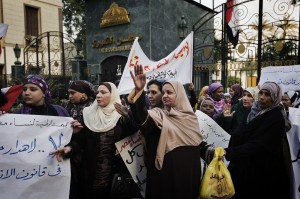
The parliamentary elections bill approved by the upper house of parliament will not require parties to run female candidates in the top half of party lists.
The provision, which was included in the original government proposed bill, was scrapped after Salafi members of parliament argued it was unconstitutional.
The approved bill will now only require parties to run one female candidate on their list but does not specify in what position.
The upper house also removed an article requiring MPs to maintain their party affiliation during their term, which would have banned independents from joining parties following their election and banned partisan candidates from joining other parties or becoming independents.
Majority leader Essam El-Erian argued that dismissing MPs for shifting party affiliations would destroy parties as dissenting members would vote against their parties.
The Freedom and Justice Party (FJP) deputy leader added that if the provision was kept MPs would lose their seats if they were dismissed from their parties, granting too much power to parties over their representatives.
Salafi Al-Nour Party MPs wanted the provision kept, arguing that the plurality or majority party would otherwise recruit independents and smaller party representatives to build a majority.
Finally, lawmakers refused to allocate a quota of seats to Christians, arguing it would entrench sectarianism in politics.
Upper house speaker Ahmed Fahmy sent the approved bill to the Supreme Constitutional Court as per the provisions outlined in the newly adopted constitution.
The court will now rule on the bill’s constitutionality and recommend changes on any aspects it deems unconstitutional. If approved by the court, the bill will be referred back to the upper house for a second vote before being signed into law by President Mohamed Morsy.
Morsy is required to call elections for the House of Representatives, the lower house of parliament, within 60 days of the adoption of the constitution. The constitution was adopted on 25 December 2012, making the deadline for elections the end of February.
However elections are likely to be held in April according to FJP spokesperson Ahmed Sabea. The Muslim Brotherhood’s political wing has announced it will run for all available seats and that it would unlikely form any electoral coalitions.
Follwing the elections, Morsy will be required to appoint a prime minister from the house of representatives who can secure the confidence of the house.

